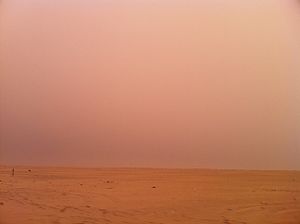| Image via Wikipedia |
I was reading Tom Stites: Layoffs and cutbacks lead to a new world of news deserts this week* and it got me thinking about how (and whether) a newspaper really is intrinsic to the fabric of a community.
It is a thought-provoking piece, exploring the concept of news deserts - although Stites is discussing US newspapers, it could just as easily be applied to the closures of local newspapers in the UK.
But it does strike me that, just because a newspaper closes, that doesn't mean news stops being reported - just that it's being reported differently, and by people who don't hold down mainstream media jobs.
Niche sectors, like Thebusinessdesk.com (biz), or How-Do (media/creative), hyperlocal blogs like Pits n Pots, spring to mind. Plus you've only got to look at the Talk About Local successes, and the even the emergence of n0tice (ok, it's in beta at the moment but I see a lot of people sharing things on other networks from there even at this early stage) as a forum for information sharing.
So while I understand the idea of news deserts I'm not sure it's a case of 'lose your newspaper, lose your news'. What did shock me though were the examples cited in the article - one US paper cutting back from 130 staff to 12 (that's 12 reporters - news-gatherers - by the way; it doesn't actually state how many production or other editorial staff were let go) - it's hard to see how the vacuum can be filled swiftly and effectively. Nature may hate a vacuum but that's dozens of content creators who have just gone from the news machine. They aren't all going to suddenly decide to start a Patch blog for their area.
Stites writes: "Elites and the affluent are awash in information designed to serve them, but everyday people, who often grapple with significantly different concerns, are hungry for credible information they need to make their best life and citizenship decisions. Sadly, in many communities there’s just no oasis, no sustenance to be found — communities where the “new news ecosystem” is not a cliché but a desert."
Of course, when you're hungry you aren't so picky about what sort of food you get - if MacDonalds is the only place open, chances are that's where you'll head.
The same holds true for information - you learn abot a big breaking story on Twitter Facebook and maybe head to MSM for more information - a news banquet if you like.
I'm just not sure fast food news is what we should aspire to as a full time diet.
* Part One:Tom Stites: Taking stock of the state of web journalism; Part Three:Tom Stites: Might the new web journalism model be neither for-profit nor nonprofit?
* Part One:Tom Stites: Taking stock of the state of web journalism; Part Three:Tom Stites: Might the new web journalism model be neither for-profit nor nonprofit?


3 comments:
Interesting post.
My first reaction when I hear of a newspaper downsizing or merging or closing altogether is the effect on people who don't have access to technology or can't afford web access in the home but who can navigate a newspaper, which provides easy access to some form of local news, of the kind that television doesn't at present provide. It's one section of society's habits inadvertantly forcing other people to comply.
Thanks Elio :)
Stu, that's a very good point; the attractiveness of a newspaper, which is a cheap, portable, provider of information (classifieds, weather, adverts n all) is overlooked a lot in our stampede towards the future.
I've been taking the bus for a few months as I've been struck by how many people seek out a copy of the Metro, and read, standing up, with it folded for convenience.
The LDP had a high take-up rate when more free copies were available too. I wonder what would have happened if that had been sustained?
Post a Comment